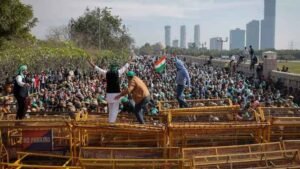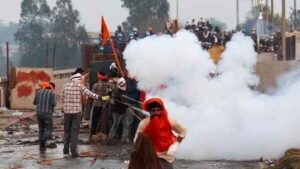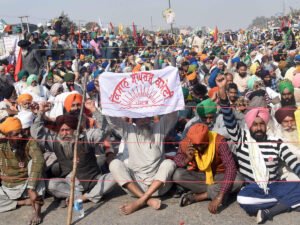Samyukta Kisan Morcha, a farmers’ union, has declared a Gramin Bharat Bandh on February 16 between 6 a.m. and 4 p.m. Since it is a gramin bandh, all agricultural activity will be halted. Many workers’ unions have supported the bandh, so village stores, marketplaces, and enterprises will stay closed.
The bandh is supported by left-wing parties as well as Congress. This bandh differs from the present farmers’ protest on the Punjab-Haryana border in that they are organized by separate groups, but the demands are the same.
Gramin Bharat Bandh is a joint appeal by SKM and Central Trade Unions to cease all agricultural activities from 6 a.m. to 4 p.m. Notable supporters of the strike include economist Prabhat Patnaik, historian Irfan Habib, economic historian Nasir Tyabji, cultural activist Anil Chandra, and journalist P Sainath.
What affects Bharat Bandh?
Gramin Bharat Bandh and the farmers’ protest will merge on February 16, when farmers will form a chakka jam on major highways throughout the country from 12 pm to 4 pm. Transportation is likely to be disrupted across the country. Highways in Punjab will stay closed until the government supports the protest.
Bharat Bandh will guarantee that no emergency services are disrupted, but no farmers, agricultural workers, or rural laborers would be working on Friday. On Bharat Bandh, the supply and purchase of vegetables and other crops would be halted.
Though SKM stated that students attending examinations will not suffer any difficulties as a result of the Gramin Bharat Bandh, there have been calls to postpone exams in Punjab, where the strike will have the most impact.
What are Farmers demanding?
Farmers are back on the streets of Punjab and Haryana, demanding a law that guarantees a Minimum Support Price (MSP) for their products. The farmers also want to enhance the MGNREGS, reintroduce the previous pension program, and secure pension and social security for all workers in the official and informal sectors.
The SKM has written to Prime Minister Narendra Modi, requesting an MSP for crops based on the Swaminathan formula of C2 50 (input cost of capital 50%), legal procurement guarantees, debt waivers, no power bill increases, and no smart meters.
The demands included free 300 units of power for agricultural and home usage, full crop insurance, and a monthly pension increase of ₹10,000 among others.
‘Dilli Chalo’ protest
Farmers from Punjab have camped at the Shambhu and Khanauri borders of Punjab and Haryana, hoping to march to Delhi to force the Centre to meet their demands.

The Delhi Police has ordered more than 30,000 tear gas shells, according to an official, as they prepare to prevent Punjab farmers from entering the national capital as part of their ‘Dilli Chalo’ protest.
Farmers from many states, mostly Punjab, Haryana, and Uttar Pradesh, held a sit-in at the Singhu, Ghazipur, and Tikri borders in 2020 to protest. They sat there from August 2020 to December 2021.
In 2020, police had to scramble quickly to examine the entry of farmers driving in a parade of tractors.










